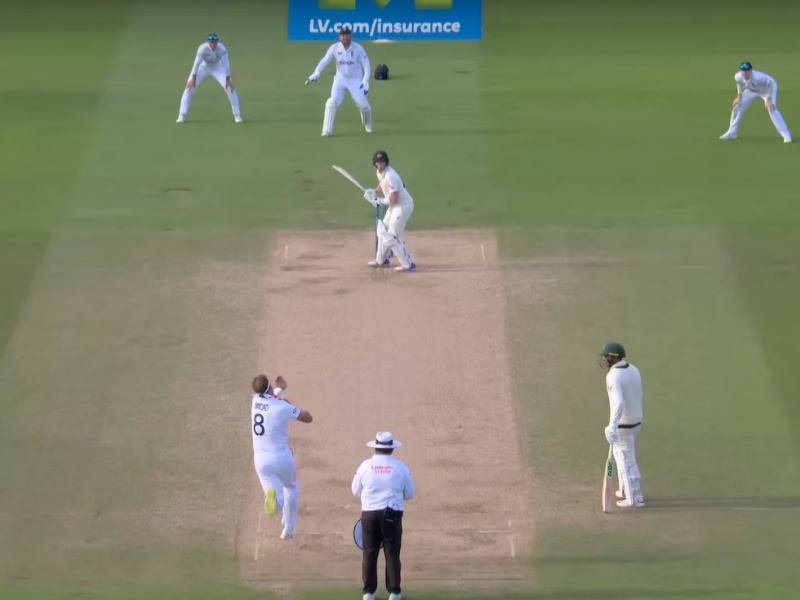Attacking is great and defending is boring and attack is the best form of defence. Also – we don’t know if you’re aware of this – but sometimes defending can be a great way of attacking. But that’s still a type of attacking, okay? OKAY!?
Swap ‘Bazball’ for ‘Numberwang’ and Michael Vaughan’s Ashes commentary increasingly resembles the dialogue in the famous Mitchell and Webb sketch. You get a little flurry of numbers and then each short barrage is punctuated with, “That’s Bazball!”
Vaughan favours the simplest and most popular definition of ‘Bazball’ – that it’s about smashing every single delivery when you’re batting. Other definitions are however available. Some acknowledge a more nuanced philosophy, while others reinterpret things to the extent that the word is stripped of all meaning.
The England team famously don’t use the term Bazball, of course. Led by Ben Stokes and Brendon McCullum, they’ve got a philosophy, but they see no reason to brand it.
One aspect of this philosophy relates not to the batting, but the rather overlooked sibling that is the bowling.
England’s bowling philosophy
“We have an ethos with the bat but also with the ball,” explained Stokes last year after playing New Zealand.
“The idea is to take 10 wickets and that is what we are trying to do; taking the scoreboard away in any situation. As long as we are taking 10 wickets, it doesn’t really matter how many runs we go for.”
Speaking after the first Test in that series, Stokes had said: “Throughout the whole week any field change or any bowling change that I made, was always to take wickets. It was never a case of just containing the run-rate or make it go a little bit dry for a bit and then see where we are.”

You hear the bowlers echo this regularly. James Anderson and Stuart Broad will speak about how rejuvenating it has been to adopt a different approach with a laser focus on taking wickets and taking wickets alone.
But then, inevitably, you arrive at a place where it suddenly isn’t that simple. And at that point, all you can do is resort to the usual ‘aggressive cricket can be all about playing really defensively‘ mental gymnastics.
How will England approach day five of the first Ashes Test?
“When you’ve got a set target to defend, you’ve got to keep one eye on the boundaries as well,” Broad is quoted as saying in Vithushan Ehantharajah’s Cricinfo piece this morning. “And actually, on a pitch like this, where it’s quite slow and hard to create a mistake from a batter, you don’t want to leak too many runs easily, waiting for that ball to break through.
“I think we’ll be smart with the fields we use. We need to protect the boundaries in certain players’ strengths. But ultimately our number one focus is to take wickets. And how do we do that? From creating pressure.”
So there you go. Slowing the batters’ run-scoring with more conservative fields is a form of OUT-AND-OUT ATTACK.

“You’ll probably see more fielders scattered around, almost like in-out fields. You know how Warnie used to bowl?” said Broad. “He’d have four people around the bat and three people on the boundary. Three an over is not hurting you, then you get the wicket and you can apply some pressure.”
All-out attack through balancing attack and defence and being flexible enough to shift the emphasis at appropriate times.
Woe betide anyone who tries to simplify cricket, because cricket’s having none of it.
Read this next: 10 things to watch out for during the Ashes
What in thunderation is the King Cricket email? Find out here
Meanwhile our Patreon page explains how this site works and what it’s about.



In all the discussions around Bazball, whether or not it is the “right” way to play test cricket, nobody seems to have suggested that for this England team, it is the ONLY way to play test cricket. That is, if they were to try to play Australia at normal test cricket, they would be more, not less, likely to lose.
In this test, we have given ourselves a chance to win. If we lose, that will be entirely forgotten in all the chuntering about the first innings declaration. It would have been worth at least 50 runs, apparently. The median and mode first innings score for England’s last two wickets in the last three years are actually 28. That might be the difference, but a) we’ll never know because Australia can only win by wickets, and b) England might not have got those 28 runs anyway. What they did was roll the dice, gave themselves a chance.
I suspect (hope) that while there might be chuntering in the shires, the response in the dressing room to a defeat here will be a resounding meh. That might just be McCullum’s greatest gift to English cricket.
Well said. Let them chunter. We’re all having a lovely time.
KP’s chuntering on that topic was especially dim. “What is he trying to say?” asked Daisy. “I haven’t the faintest idea”, I replied.
I agree wholeheartedly with Bert. England’s best chance is to play the way they have been playing. That chance is reduced by the narrow loss today, but certainly not extinguished.
What a test match. And the mouthwatering possibility of several more like that.
Seconded all. Except to say that, in the seething cauldron (?) of the BBC Sport comments section, I have seen the occasional person say “if England had played more ‘sensibly’, they would have got out just as quickly, just for less runs”. Maybe that was you Bert!
Outrageous. How many times do we have to point out, it’s ‘fewer’!
Yes, outrageous. How could you confuse me for someone who might make that sort of mistake?